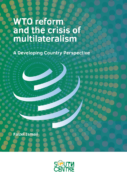Association of Southeast Asian Nations (ASEAN)
Policy Dilemmas for ASEAN Developing Countries Arising from the Tariff Moratorium on Electronically Transmitted Goods
By Manuel F. Montes and Peter Lunenborg
This paper examines the policy dilemmas facing developing countries in ASEAN in working within, and participating in, international negotiations toward making permanent the WTO tariff moratorium on duties applicable to electronically transmitted goods. In the context of ASEAN’s countries’ trade-oriented development strategies, the analysis considers the moratorium’s impact on tariff revenues, economic performance, and industrial development prospects. The paper presents estimates of tariff impacts and studies the national policy implications of the moratorium. An extension of the moratorium would establish a special regime for a class of goods whose components are contentiously defined but with a potential of being an important source of tariff revenue and of having an impact on industrial development in the future for developing ASEAN countries. This special regime for electronically transmitted goods cannot be justified as a global public good and is unnecessary. The removal of the regime would restore national space in developing ASEAN countries and allow them to obtain tariff revenues from the trade of these goods and to upgrade domestic capabilities in participating in the digital economy.
(more…)
TRIPS Flexibilities and TRIPS-plus Provisions in the RCEP Chapter on Intellectual Property: How Much Policy Space is Retained?
By Vitor Henrique Pinto Ido
The Regional Comprehensive Economic Partnership (RCEP) was signed on 15 November 2020 by 15 Asian-Pacific countries (ASEAN—Brunei Darussalam, Cambodia, Indonesia, Laos, Malaysia, Myanmar, Philippines, Singapore, Thailand, and Vietnam—, and China, Japan, South Korea, Australia and New Zealand), comprising about one third of the world’s population and economy. India was a crucial party to the negotiations but opted out of the agreement. Ratification of the agreement is still pending, subject to more Parties ratifying it at the national level. This paper provides a broad overview of the RCEP agreement and discusses the details of the intellectual property (IP) Chapter. Significantly, it does not contain substantive TRIPS-plus provisions that undermine public health in developing countries—although it does contain such provisions in other areas such as copyrights, trademarks, and IP enforcement.
(more…)
WTO reform and the crisis of multilateralism – A Developing Country Perspective
 About the Book:
About the Book:
The WTO has not been able to recover since the collapse of the Doha Round in July 2008. Several ministerial conferences including the Buenos Aires meeting in December 2017 failed to reach agreement. The US Trump Administration launched a campaign to reform the WTO in 2018 and 2019. This book argues that the Trump Administration reform proposals have been much more aggressive and far-reaching than the Obama Administration before it, threatening to erode hard-won special and differential treatment rights of developing countries. By blocking the appointment of new Appellate Body members, the US has effectively paralysed the Appellate Body and deepened the crisis of the multilateral trading system. Developing countries have responded to the proposals and called for the WTO to be development-oriented and inclusive. This book provides a critical analysis of the US-led reform proposals and seeks to build a discourse around an alternative set of concepts or principles to guide the multilateral trading system based on fairness, solidarity, social justice, inclusiveness and sustainability.
Author: Faizel Ismail served as the Ambassador Permanent Representative of South Africa to the WTO (2010-2014).
(more…)













 About the Book:
About the Book: